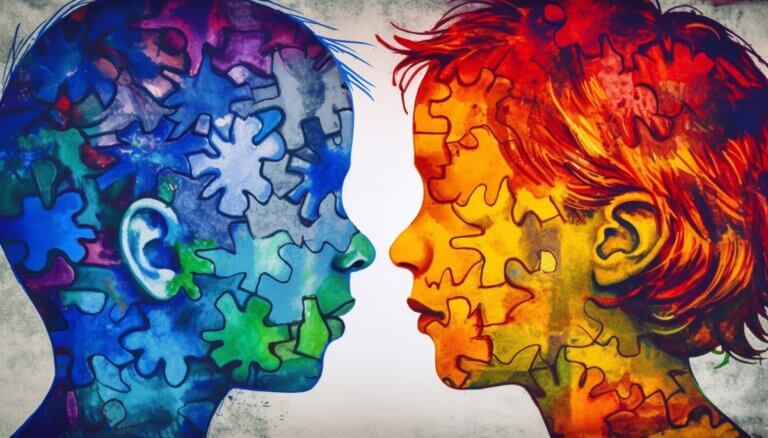Table of Contents
Emotional Intelligence in Professional Life

Self-perception and Self-management
Emotional Intelligence Communication Competence plays a pivotal role in dealing with our daily tasks and challenges, especially in a professional environment. Self-awareness and self-management are two fundamental aspects of Emotional Intelligence in communication, which not only contribute to more effective conversation management but also significantly influence our productivity and job satisfaction.
The Importance of Self-Awareness
Self-awareness is the ability to recognize and understand one’s own feelings and emotions. It forms the basis for Effective Communication, as only those who understand their own emotions can appropriately respond to the emotions of others. An example from professional life: An employee receives critical feedback from their supervisor. Instead of reacting with rejection or defense mechanisms, they use their self-awareness to recognize that their initial reaction is frustration. This insight allows them to remain calm and constructively respond to the feedback.
- Active listening as a tool to uncover hidden emotions in the communication of others as well as to reflect on one’s own feelings.
- Self-reflection at the end of the workday to analyze emotions and events that influenced work performance.
- Maintaining an Emotion Diary to identify emotional patterns and learn from them.
Strategies for Self-Management
Effective Self-Management involves controlling our emotions and behaviors to achieve our goals, even under pressure. For example, through targeted stress management techniques like brief relaxation techniques or time management methods, handling time pressure can be significantly improved. Employees who have learned to regulate emotions like anger or stress are able to remain focused and productive even during challenging tasks.
- The use of breathing techniques or mindful moments to reduce acute stress.
- Setting realistic goals and priorities as part of time management to prevent overload.
- Seeking feedback to better understand and control one’s own emotional reactions to certain situations.
Mastering self-awareness and self-management not only improves communicative ability but also positively influences team dynamics and the workplace atmosphere. Employees who are aware of their emotions and manage them effectively contribute to an open, trustworthy, and productive work environment. Here, the full extent of Emotional Intelligence Communication Competence is revealed: It is not only invaluable to the individual but to the entire organization.
Social Awareness and Relationship Management
Emotional intelligence is a key component when it comes to creating a harmonious work environment and fostering teamwork. Particularly in the field of emotional intelligence in communication and effective communication, social awareness and relationship management play a crucial role in the success of any company or project. Instead of proclaiming, these skills invite us to adopt the perspective of others and to act from this new viewpoint.
Understanding and Empathy as the Foundation of Effective Teamwork
Managing one’s own emotions is one thing, but the ability to recognize and respond appropriately to the emotions of others is a whole different challenge. Emotional intelligence communication competence means perceiving the emotional states of team members and using this knowledge to improve the working atmosphere and cooperation.
A practical example of this is dealing with conflicts in the workplace. Conflicts are normal, but the way they are handled can make the difference between permanently disrupted relationships and strengthened trust. A manager with pronounced emotional conversational skills might notice that tensions between two employees are based on a misunderstanding and could bring about a resolution through empathetic mediation.
Effective communication and emotional intelligence go hand in hand – they enable us to communicate with sensitivity and awareness of others’ emotions.
Social Skills as a Vehicle for Empathetic Leadership
Emotional intelligence enables leaders to create a motivating environment where employees feel valued and understood. For example, leaders with strong social and communication skills can conduct empathetic conversations that not only boost an employee’s performance but also their commitment and loyalty.
Suppose a team member suddenly shows declining performance. A leader with emotional intelligence might recognize that this decrease might be due to personal challenges. Instead of criticizing, a constructive conversation could be held where support is offered and solutions are sought together.
- Through empathy and social skills, not only are individual employees recognized in their needs, but the entire team is strengthened in its collaboration.
- Emotional intelligence communication competence creates a bridge between individual needs and the goals of the company.
- The empathy in leadership contributes to an open and trusting corporate culture.
Thus, it is evident that emotional intelligence in communication and relationship management are essential components for a positive work environment and successful teamwork. They not only allow for a deeper understanding of the participants but also promote the development of a supportive and high-performing team.
Emotional Intelligence in Personal Relationships

Emotional Intelligence in Personal Relationships
Emotional intelligence in communication is an essential building block for successful interpersonal relationships. Especially in friendships and partnerships, the ability to understand and respond to others’ emotions plays a crucial role. Core components of emotional intelligence like empathy and active listening contribute significantly to strengthening connections and maintaining them long-term.
Empathy as the Core of Emotional Intelligence
Empathy – the ability to put oneself in the emotional states of others – is more than a virtue; it’s a communicative skill that can be learned and refined through Emotional Intelligence Communication Competence. Putting yourself in the shoes of a friend who had a bad day, or feeling the pain of a partner as if it were our own, is key to building genuine bridges of understanding.
- In a study, researchers were able to show that couples who were capable of displaying high levels of empathy resolved conflicts more successfully and reported higher satisfaction in their relationship. This highlights how central empathy is for relationship maintenance.
- Effective communication also involves the ability to read non-verbal signals and respond appropriately. The gesture of a friend, the facial expressions of a child – these are all clues to what’s happening inside others, and empathy allows us to interpret them.
- In the professional context, empathy should not be underestimated: It leads to a better working environment and strengthens teams by making each member feel understood and valued.
The Art of Active Listening
Another central aspect is active listening. It’s not just about hearing the words of another, but about an intensive form of attention that means we really want to understand what is being said – both on a content and emotional level.
- When we actively listen, we signal to our counterpart that their thoughts and feelings are important to us. This fosters Effective Communication and trust in the relationship.
- Examples from couple therapy illustrate how couples learn to understand each other better through active listening and reduce misunderstandings, which leads to a stronger, more harmonious partnership.
- In friendships, active listening can determine whether a friendship remains superficial or develops into a deeper, supportive connection.
Emotional Conversation Management in Everyday Life
Emotional conversation management is the practice of applying empathy and active listening in daily dialogue. It involves showing genuine interest and understanding to nurture long-lasting relationships. The Communication Skill in the sense of emotional intelligence can be developed and improved through regular practice.
- A practical example: In a guided conversation between friends about personal fears and goals, emotional conversation management requires both parties to deeply engage with the other’s emotional state.
- In a professional context, emotional conversation management means, for example, giving a colleague room to articulate their challenges while listening patiently and offering support.
- Social interactions, whether in family, friendship, or partnership, significantly benefit from thoughtful and empathetic conversation management, positively influencing interpersonal dynamics.
By practicing Emotional Intelligence in communication, we invest in the quality and depth of our relationships. The ability to truly understand and feel what others are experiencing is an invaluable asset that enriches social interactions and solidifies them.
Emotional Conflict Resolution and Resilience
Emotional intelligence can be defined as the ability to recognize, understand, and manage one’s own emotions and those of others. This competency plays a crucial role in emotional conflict resolution and resilience. Through effective communication based on emotional intelligence, we can not only resolve conflicts but also use them as opportunities to learn and grow.
Emotional Intelligence in Communication
A highly developed emotional intelligence communication skill enables a person to conduct conversations objectively even in heated debates. Consider the example of a family argument: Instead of reacting defensively and launching counterattacks as old habits might dictate, emotional intelligence allows for a deeper understanding of everyone’s viewpoints. Suppose a teenager argues with their parents about curfew times. Instead of immediately resorting to punishment, the parents could, through active listening and expressing empathy, work out a solution that meets everyone’s needs.
- The ability for self-regulation allows for controlling emotional responses and avoiding impulsive behavior.
- Empathy, as a core aspect of emotional intelligence, helps understand the emotional state of others and respond appropriately.
- Social skills such as relationship building and networking are strengthened by high empathy and communication ability.
Resilience through Emotional Intelligence
Resilience refers to psychological resilience, the capacity to recover after setbacks. Emotional intelligence plays a key role here. Consider the handling of professional setbacks. A person with high emotional intelligence is more likely to view these events as opportunities for self-reflection and improvement rather than being overwhelmed by negative emotions.
- Through self-confidence, one of the five elements of emotional intelligence, individuals strengthen their confidence in their own abilities, making them more resilient.
- Motivation, another pillar, drives people to continue despite challenges and pursue their goals.
- The ability for emotional conversation enables finding support within one’s social network, which is essential for building resilience.
Using emotional intelligence in communication and conflict resolution means not only maintaining personal and communal well-being but also strengthening relationships and building resilience. In times of conflict, this often leads to emerging stronger from disputes and continuously improving interpersonal skills.
Summary
Emotional intelligence in communication is an indispensable tool for effective interactions in both professional and private spheres. It facilitates the understanding of one’s own emotions and those of others, contributes to conflict resolution, and promotes a collaborative environment. A key aspect of emotional intelligence communication skills is self-awareness – the ability to recognize and understand one’s own emotions. This forms the basis for acting productively and satisfactorily in a professional setting. Active listening, self-reflection, and keeping an emotion journal are methods that help sharpen this skill.
- Active listening allows you to discover hidden emotions of the conversational partner and to address them.
- Self-reflection strengthens awareness of one’s own emotional states and their impact on work performance.
- The emotion journal helps to identify emotional patterns and learn from them.
Effective self-management is another pillar of emotional intelligence in communication. It enables individuals to remain factual and focused under pressure. Techniques such as breathing exercises or setting realistic goals help control stress and optimize personal and team performance.
Emotional conversation leadership and empathy are core components that are essential in every type of interpersonal relationship. For instance, leaders can create a work environment where employees feel valued and where the team works closely together.
Empathy as the Core of Emotional Intelligence
Empathy enables us to develop a deeper understanding of the emotions of others. Studies show that couples with pronounced empathic abilities resolve conflicts more effectively and report higher relationship satisfaction.
- The interpretation of nonverbal signals plays an essential role in effective communication and relationship management.
- Empathy in the workplace promotes a positive work atmosphere and strengthens teamwork.
- Active listening reveals the desire to truly understand the other person and thus enhances the depth of the relationship.
Practicing emotional intelligence and communication skills in daily exchanges strengthens the quality and depth of relationships. Building resilience in conjunction with emotional intelligence enhances the capacity for self-regulation in difficult situations and makes people more resilient to setbacks. Thus, emotional intelligence makes a crucial contribution to personal well-being and success in professional life.
FAQ – Emotional Intelligence in Communication
How can emotional intelligence contribute to conflict resolution in a team context?
Emotional intelligence enables team members to navigate conflicts constructively by understanding and regulating their own emotions and those of their colleagues. Through active listening, empathy, and the ability to control emotional responses, teams can defuse tensions, clarify misunderstandings, and foster an atmosphere of collaboration. This leads to solutions based on mutual respect that increase productivity and the well-being of all participants.
How can emotional intelligence help avoid misunderstandings in interpersonal communication?
Emotional intelligence enables us to recognize and understand our own feelings as well as the emotions of others, and to respond appropriately. By learning to empathize with others’ perspectives and paying attention to non-verbal signals, we can adapt our communication to reduce misunderstandings. For example, through active listening and empathy, we manage to defuse conflicts before they arise and build a deeper connection with our fellow human beings.
How can emotional intelligence in employee management contribute to minimizing conflicts and improving work morale?
Emotional intelligence in leadership allows managers to better understand the emotions of their team members and respond appropriately, which can help prevent conflicts by detecting and addressing misunderstandings and tensions early on. By creating an empathetic work environment where employees feel valued, emotional intelligence can boost work morale, as employees are more motivated and committed when they feel their emotional world is acknowledged in the workplace.




